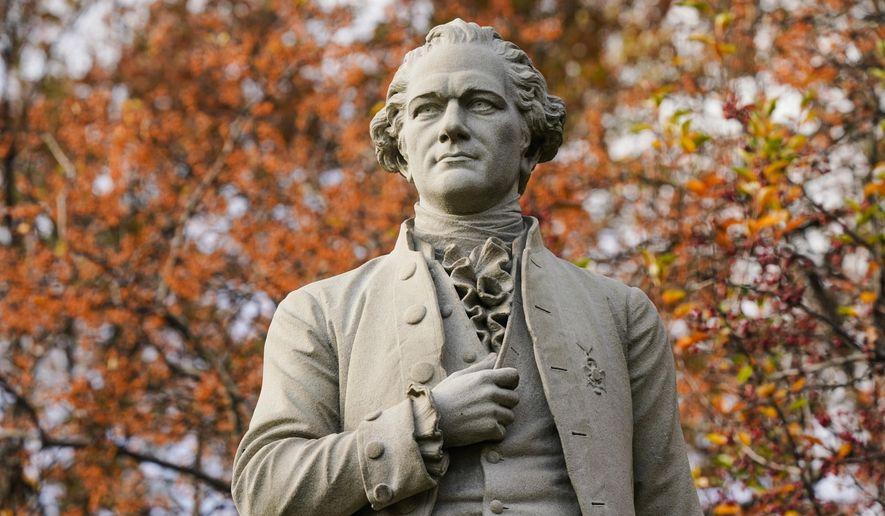OPINION:
Editor’s note: This is one in a series examining the Constitution and Federalist Papers in today’s America.
Alexander Hamilton’s relentless insistence on a set of national institutions — a commercial economy, a navy of respectable weight and a central bank — laid the foundation for modern American global hegemony. These institutions fostered the internal health of the young republic and prepared the country to engage successfully in the international arena.
Hamilton had a quick ability to recognize how these institutions would be integral to the success of the new republic. Together, they would provide the infrastructure for the United States to effectively protect itself and project power abroad.
From the beginning, Americans were torn about the level of effort they should put toward engaging abroad. Wishful thinking about avoiding what Thomas Jefferson famously dubbed “entangling alliances” was rampant during ratification debates. Many Americans believed that avoiding alliances and refusing to partake in the habitual hatred or habitual fondness toward other countries would help avoid war. These sentiments are still alive today.
But not only is an isolationist stance difficult to maintain, it also was never embraced in the way many people imagine. As early as the 18th century, a precarious geopolitical environment was forcing America to consider how she would deal with foreign influence in the New World. Throughout the 19th century, the United States actively pursued both westward expansion and international commercial opportunities.
Hamilton believed that both versions of expansion were good and thought — as Machiavelli had 300 years earlier— that successful republics were naturally expansionist.
The Founders assumed their principles of self-governance would spread internationally and the United States would come to dominate the New World. But none of them was seeking to build a traditional empire. Even the Monroe Doctrine was an attempt to avoid ensnarement in Old World rivalries, without capping America’s own regional influence.
During the Constitutional Convention, Hamilton was irritated with the hesitancy of other delegates to think beyond state sovereignty. The Federalist case for ratification of the Constitution hinged on convincing anti-Federalist skeptics that an agrarian economy and weak federal institutions might jeopardize liberty rather than protect it.
Hamilton’s insistence on a commercial economy and an energetic government was criticized — then as now — as antithetical to the liberty for which the colonists had just fought a bloody and successful war.
Advocates for an energetic commercialism found their voice in James Madison’s Federalist No. 10, in which commercialism is espoused as vital for preserving liberty. Madison argued that a healthy economy creates the kinds of political divisions and factions needed to ensure that no one group gains a majority voting bloc. Instead of a singular poor class and singular wealthy class, the disunity that stems from people possessing different types and degrees of property is precisely what prevents a majority from forming and using their voting power to tyrannize the few.
There was, however, a certain kind of faction Hamilton feared would be concerned by a robust American economy. That “faction” was the Europeans. To cure this, the states needed both the unity a constitution would provide and a navy to protect them and project their preferences.
Without a strong navy, Hamilton feared the fruits of America’s “unequaled spirit of enterprise,” extolled in Federalist No. 11 as “an inexhaustible mine of national wealth,” would become “prey to the wanton intermeddlings of all nations at war with each other.” The unhappy result would be foreign powers “clipping the wings by which we might soar to a dangerous greatness.” Yet “with wisdom” (a national defense) “this same enterprise might make admiration and envy of the world.”
Despite his belief in financial institutions, Hamilton rejected the hypothesis that financial ties have “a tendency to soften the manners of men” and produce peace. Instead, in Federalist No. 6, Hamilton asked a simple question: “Have they [great powers] in fact pursued it?” Of course not. Nations involved in commerce still warred with each other all the time.
Hamilton knew “the rights of neutrality will only be respected when they are defended by an adequate power.” In Federalist No. 11, he contended that a navy would force competitors to set a price “not only upon our friendship, but upon our neutrality.”
This is also why Hamilton wanted a central bank that would inoculate the new nation from any need to borrow from European powers. Financial stability went hand-in-hand with national security.
Hamilton saw an independent industrial base — one that could supply the necessities of war — as a critical source of American power. He was an unapologetic advocate for an executive endowed with enough power to make wartime decisions.
He was, finally, a gifted administrator. By the time he left the Treasury Department in 1795, most of what Hamilton called “my commercial system” had been established. Hamilton’s mark on American government and the international financial system is undeniable. It was his economic program that led to the eventual transfer of the world’s financial center from London to New York. It was his conception of a commercial economy that led to American economic supremacy and victory in two world wars.
Victory in those wars resulted in the opening needed to create a world order based on American revolutionary principles of liberty.
Hamilton’s vision of a strong economy, a strong navy and a strong government helped realize the Founders’ vision of American republicanism spread throughout the world.
• Rebecca Munson is associate professor and department chair in the Helms School of Government at Liberty University.





Please read our comment policy before commenting.